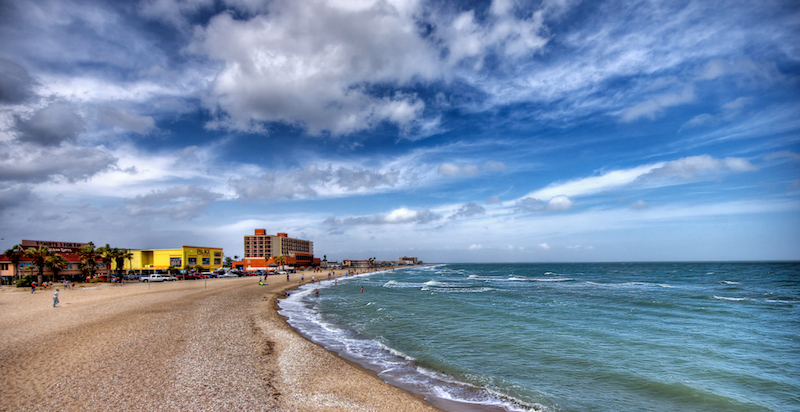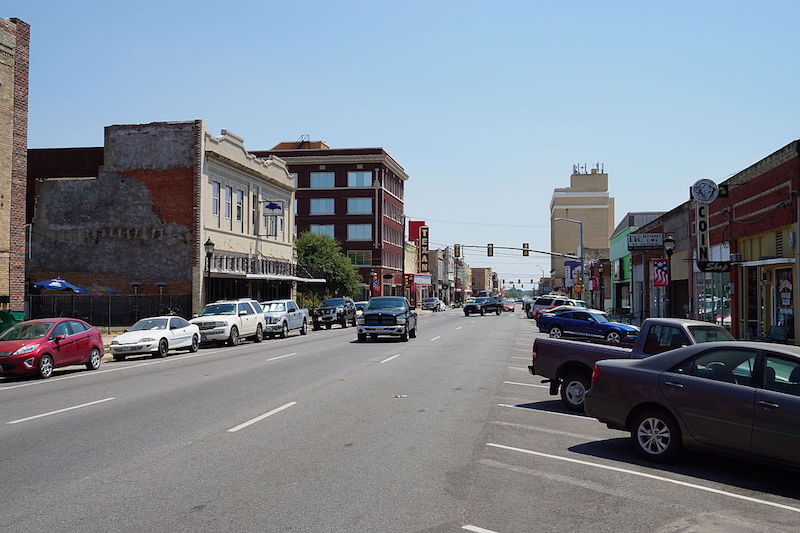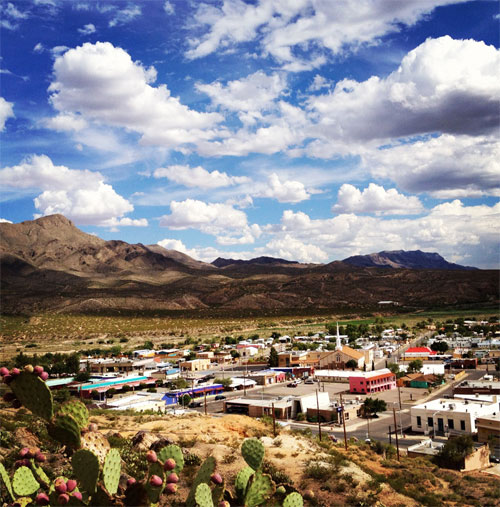Christina Rees and Neil Fauerso chat about the creative potential and appeal of living and making work in unlikely towns and places.
Christina Rees: Let me make sure we’re on the same page about this. You and I were both in Marfa over Thanksgiving, and at one point we were hanging out and the subject of the Texas coast came up, and I said to you (based on a piece you wrote for Glasstire recently): “You like Corpus Christi, don’t you?” And you said yes, and revisited a point you had made in that piece, which is the idea that uncool towns are, at this point, inherently cooler than “cool” places. More and more I agree with this. As my husband and I drove through Midland and Odessa and Monahans on the way out to Marfa from Dallas, we had been looking around us at the passing towns and talking about that very thing. Even he (the Londoner) said that if you’re a creative person, the really interesting and unexpected and transgressive thing to do would be to move to a place like Odessa.
Did I get that right?
Neil Fauerso: Yes, that’s pretty much it. I would define “cool” cities as one with a global pedigree of commerce and culture such as New York, LA, San Francisco, Portland, Seattle, and Austin. And I think it’s very hard to not just be a creative person in these cities, but really to any kind of person that’s not working a white-collar job (e.g. tech/law, etc.) or independently wealthy. These cities have become expensive, crowded, and cutthroat. The bohemian scenes that are so integral in their branding (e.g. Austin as the ‘Music Capitol of the World’) exist now mainly as a shadow simulacrum of the past, referenced mainly in the interior design of expensive open restaurants and boutique hotels.
Obviously, I am not saying that there is no good art happening in these cities. There’s a lot, and of course several of the cities — New York and L.A. — are essentially global hubs for many types of art and creative industries. I just think that most creative people would do better work through living less-stressed, freer, stranger lives in “uncool” places.
CR: I’m not even sure a new generation of artists are going to have much of a choice about this going forward. The international cities we think of are so expensive at this point that being able to pay your bills in one while also making art seems like a receding dream. And really, once you get to Manhattan, or even a lot of Brooklyn, you’re just dealing with the blanket of wealth anyway. Which on its own is very under-stimulating for an artist. Rich, white-washed places are not particularly inspiring, unless your creative goal is to document or satirize or lambast that milieu.
The migration of creative people takes on a different form in this context (though with some historical precedent), of trying to find and cultivate “The Next Marfa” or “The Next Asheville.” Which makes an old town very trendy very quickly, but also pretty exclusive to whatever cliques settle in first.
To make a new small art scene, where an artist has other artists to talk to, is quite an undertaking, and it’s often really just the side-effect of someone else’s grander but personal ambition. Someone with some vision and even arrogance (and frankly, money) usually has to make the first move. Donald Judd, or, earlier, the founders of Black Mountain College… .
But I don’t think you’re interested in art colonies or places of potential art pilgrimage. I think you’re thinking of really uncool places that stay uncool and aren’t ripe for this kind of colonization at all.
NF: Yeah, I’m not type A or organized enough to spend much time thinking about artists’ colonies. Although if I were rich, I would buy a historic block of buildings in downtown Corpus Christi for $500,000 (which you can do) and turn it into an arts compound called, like, The Cooler. To be fair, this philosophy is obviously influenced by my own lifestyle preferences. I don’t like working jobs to make money to get by (and honestly a “career” in something you don’t have that much interest in is simply a longer-term version of this) and I don’t really get any “spiritual” satisfaction from them. I don’t like crowds and I think waiting long periods of time to eat or drink at a new, slammed, hip place is perhaps the single biggest waste of time you can engage in aside from playing video games.
I agree that moving to these “cool” cities now is a receding dream. Most of the cool cities are a grind to live in if you make less than six figures (New York, unless you’re some hedge-fund ghoul who glides through life as if on an invisible Segway). I don’t think the relentless struggle and stress of working unstable and underpaid jobs — trying to make rent and pay bills, living in some obscenely overpriced shithole with too many roommates — is ennobling or creatively inspiring. I don’t think it builds character. I think it sucks and it kills your soul. It’s an epic and grand con to make us believe that writhing like a worm on a hook is valuable to one’s life, a con that keeps a seemingly endless flow of dreamers to be cogs in the humming machines of a few people/entities (landlords/corporations) who continue to get stratospherically wealthier. This isn’t to say that living in an uncool city is some utopia; you still work unstable and underpaid jobs, but you might live in a decent place by yourself that costs a quarter of what rent in a cool city would.
I also heartily agree that living in expensive, rich places is creatively under-stimulating. And even if your goal is to document or satirize that milieu, that’s not particularly interesting to me. I’m tired of movies and shows and novels about white people in New York or LA or San Francisco and the generally boring work cultures they satirize. I recently wrote an article about this musician Alasdair Willis who goes under the alias The Vitamin B12. He’s made and released hundreds of albums over the last 30 years. Since 1986 he’s lived in Brighton; he works at a co-op and records music in his loft every week. The range of music he makes is staggering — minimalism, punk, noise, lounge, experimental, techno, jazz. Working on the piece I found the contrast of that so inspiring — his modest chill life in Brighton and the amazing, eccentric creative world he’s forged. It’s like that Flaubert quote: “Be regular and orderly in your life, so that you may be violent and original in your work.” Modern cool cities are almost designed to withhold regularity from most of its citizens, rendering a desperate workforce.
CR: One thing we’re both at least hinting at, however, is that our fictional creative person who’s settled in this uncool place (or maybe our projections of our future selves) still has other creative people to hang out with and talk to and bounce ideas around with. Even you mention an artist compound. I don’t know that being the only serious or professional artist in a really conservative backwater small town sounds very appealing. It sounds lonely.
But there are two ways of looking at this. One is the idea that any place, almost no matter how small, has some interesting people in it, simply because people are interesting. You have to scratch the surface to find them, but they’re there. Their day jobs and the surface facts of their lives aren’t a true reflection of their inner lives or creative thinking.
The other is that a place has to be interesting enough on its own that more than one artist wants to settle there. Which means it needs to have some sort of history, some sort of independent and workable, recognizable industry, some kind of integrity in its architecture and even just the straightforward way it presents itself. Corpus and Odessa are not trying to be “international cities” or to attract hipsters or to be something they’re not. Not really. That’s got a kind of weird appeal.
But obviously, plenty of people who have escaped their very-small-town upbringing, or their McMansion-y ultra-bland exurban one, would say that it’s crazy to think an artist should move to a place like Vidor, or to Murphy. Artists aren’t in those kinds of places voluntarily.
NF: Yeah, there’s definitely an “uncoolness” that’s optimal, and will be defined by personal preferences, some of which are probably fairly universal. For me that means a city that has some history and culture, a few decent restaurants and bars, some natural or architectural beauty, while still being cheap and non-trendy. I live in San Antonio, which checks most of these boxes, and if I were to move it would be in a downward slope of leisure to Corpus or Alpine. One of the main reasons I like living in Texas is I like the landscape and the atmosphere, it’s harsh and cool and cinematic. And this extends throughout the state.
I grew up in the midwest, a region I generally detest (esp. Iowa, Kansas, Nebraska, Indiana) so I would rather live in a bear locker in an alley in San Francisco than a Victorian mansion in Ottumwa, Iowa. Although Ottumwa is so bleak (it’s vibe is highly Gummo-esque) that living there as an artist would be truly transgressive. Al Capone had a hideaway mansion on a hill in Ottumwa, where he’d lay low, under the wet bruise of Iowan skies, mad and babbling from the beginning stages of untreated syphilis. Now that I think about it, I can easily imagine a place as grim as Ottumwa being creatively inspiring.
I think you hit on it by writing: “But there are two ways of looking at this. One is the idea that any place, almost no matter how small, has some interesting people in it, simply because people are interesting… .” This idea is less about naming specific cities to move to than a perspective shift on what it means to live creatively.
Rainey’s recent piece and the speech by Matthew Collings have me thinking and questioning the concept that art is both a societal good and has the obligation to be one. I’ve come to the conclusion that if you want to improve the world in material terms (or at least soften its demise), you should not be a creative person or work in the field of creativity. I say this as someone who is a currently licensed lawyer. I worked in corporate law and ranged from being bored to being disgusted. I could work as a public defender or doing immigrant advocacy. That would be a more noble life and one more in line with my professed leftist positions. But I don’t want to do that. I want to witness. I think there is a value of bearing witness (which could mean everything from educating one’s self of true history as opposed to the winners’ lies, to being engaged creatively, to being an artist), if not socially then certainly personally. So I’ve been thinking about where one can witness, and I believe it requires some modicum of calm and repose.
CR: I have an artist friend who recently fled a plum tenure-track job at a university in a small town in the upper midwest. She couldn’t find her scene at all. Damning herself to that town for life felt like her own death. She’s looking for teaching jobs in Texas and starting over again.
We can be specific about college towns, though, can’t we? We’re not much talking about them for a reason, given their ‘Forbes Top Small Towns in America List’ appeal. I mean, a ton of people would love to live in, say, Athens, Georgia. I have friends who are very happy in Denton, with good reason. The bigger the university, the more the students and faculty brings that progressiveness with them that can pervade the town.
But Texas is an odd duck. It’s insanely conservative in ways and in places, and absurdly independent in other ways and places. I wonder if one of the reasons you and I have cited places in West Texas and on its central and western coast is lack of density, and in the case of West Texas especially, it’s distance from old Deep South (white) religious conservatism. Out west and on the border, people are working, they’re spread out, they’re too busy to tell you how to live. They don’t want to be told how to live. I’m not saying they’re not going to church. But if I threw two darts at a map of Texas and one landed on Kilgore and one landed on Pecos, I’d go to Pecos. Or Terlingua, right? You and I will do that trip in the new year. By the time we land there we’ll be late and it will be well beyond officially “cool.”
And I hate to break it to you, Neil, but Alpine is “cool” now. Towns adjacent to “cool” towns get enough overspill to be considered. The same way creative people migrate from Austin to Bastrop, Buda, Elgin.
NF: I grew in southeast Iowa and I remember the sky being low, the lakes muddy and disconcertingly soft at the bottom, the air often filled with the scent of pig shit, the houses squat, the food so terrible it seemed like a Buñuel film, and the general vibe being that laughing too loudly or having too much fun was a sign of moral weakness. So I can see why your friend left.
I don’t think we’ve talked that much about college towns because they are self-evidently nice places to live. If a friend were to move from New York to Ann Arbor or Madison or Athens, a friend’s reaction would not be “What?” but rather, “Cool, I’ll visit you sometime.” I guess what I’m talking about is in some ways a southwestern city or town. I think you’re right about the appeal of West Texas and the atmospheric freedom it instills. The sky is big, the sun is bright, it’s quiet. (Truly the only good moment of Tom Ford’s astoundingly terrible Nocturnal Animals is when Jake Gyllenhaal says: “That’s what I like about West Texas — no phones and no people.”)
I’m also realizing that this theory is somewhat rooted in my own desire for solitude. I live a pretty simple life in San Antonio: I work, I see my family, I go see art shows, I listen to records and read books about trickster gods. That’s about it. Sometimes I’ll walk a mile to the Rivercenter Mall to see a movie because the theater has fully reclinable lazy boy seats that are extremely comfortable if borderline obscene.
My sister (the artist Joey Fauerso) has recently begun educating me on the world of art residencies and the application process (she’s gone to several in places like New Mexico, Berlin, and Iceland). The appeal of an art residency is obvious: go somewhere chill, and spend your time witnessing and responding. I hope one day to get one. Maybe I could finally write the really bleak screenplay about the guy Crocodile Dundee was based off of. In the meantime I try to make my life as much a residency as possible.
PS: My Terlingua dream is we’ll show up and randomly run into Hills Snyder playing a didgeridoo, which is by no means impossible.







9 comments
Well, I was finding this line of thought interesting back to the previous article so I was innocently enjoying this round…then…
And I agree, that could happen, given y’alls tendencies to wander unencumbered by “cool,” which by the way, I’ve been saying for years is just a form of soft fascism…
At any rate, it’s an extremely timely conversation — thank you very much for having it in way that offers others the opportunity to read it.
https://youtu.be/ijXxMoArMVc
Mmm, just one word on living in an uncool town as a working-for-a-living artist: opportunity costs.
Try it in Edinburg…it’s on the way to the “boarder wall”
Beat us ille qui…https://m.youtube.com/watch?v=3B0D2gCH8dM
I recently had a show at LHUCA in Lubbock and was blown away by the intensity and enthusiasm of the budding art scene there – seems like the whole town showed up for LHUCA’s artwalk opening….thousands anyway. Plus there seem to be a lot of of empty cool old buildings just waiting to be cheap studio space.
Sherman, Texas may well be one of the top-tier least cool towns in Texas sitting at the apex of an isolateral triangle formed by the population dense north Texas “metroplex”. So uncool and isolated as to instill a deep sense of existential despair yet close enough to the urban mess-o-plex that one need not fret. Check it out!
I left Houston a year ago for many of the reasons mentioned above. I live in a little southwestern hamlet of 231 people and have the solitude and space to make work uninterrupted at a pace I haven’t experienced since the infantilized years of graduate school. I was less concerned about finding some kind of “critical mass” of creatives to share ideas with as growing older has also shown signs of a shrinking social life. I joined the volunteer fire department to accelerate my intention to see the world outside of the hyper commerce bubble of metropolitan environments, and also, to meet people. To my surprise I met artists, writers and thinkers with the same impulse and also pipe fitters, truck drivers and farmers that have become close friends. I’ve witnessed that life, outside of urban centers, is in the midst of a severe opioid health crisis and is a fragile social organism in it’s own right. Artists are not exempt from civic duty. My participation in this community has taught me more about the role of an artist than any classroom or heavy handed, wall text loaded institutional exhibition.
Ditching the city for rural America is the most radical thing an artist can do. Take your ideas out of the echo chamber of an over educated, like minded urban setting and put them to the test. You’ll be amazed by how responsive the world can be and will find clarity in the push back.
I guess I’m “uncool” for going to the “cool” place. Ehh…I’ll live.
I moved to NYC about 15 months ago for a lot of reasons. An important one was to have new conversations in a place with abundant opportunity to do so. Having done many (isolated) residencies over the years and being part of a bootstrapped artist-run coop, I guess I was looking for something other than what this piece alludes to. My studio here is fine. No complaints. I’ve also held on to my studio in Houston and I have returned regularly. While I never took it for granted, my gratitude for Houston has definitely increased since arriving. It’s still affordable and warm to artists. I think it still hits the “sweet spot” for many working artists who don’t want a NYC level expense but are concerned they’ll go “cuckoo for cocoa puffs” staking claim in a small town.
I can’t imagine being a young artist starting out here, though. This place has become a playground for the wealthy. I was a visiting artist at Hunter last year where the professor was telling his students to move to Detroit after they graduated.